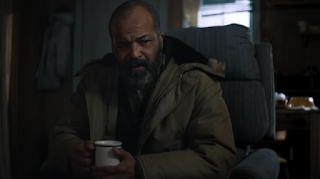Set to the back drop of a German
1977 hijacking crisis, Suspiria 2018 already pushes its self apart from the
original Suspiria and sets a tone of sisterhood, the frustration and conformity
and influence of dance, true love, parental influence, possession, ageism, loss
and political tyranny. All stirring into a horror film more shocking and grotesque
than the original, but just as chillingly beautiful.
Suspiria
2018 maybe written by multiple people and feel that way, but it definitely
makes sense of things the original Suspiria never bothered to; Aiming for a
satisfying conclusion by tying loose ends, expanding the world and giving
purpose to the protagonist in a meaningfully way, which departs this version
from the slasher aesthetic of the 1977 film.
Suspiria
2018 sometimes comes off as a vignette of disturbing images and abstract ideas,
but overall is pulled in by a focused narrative that sets out to give
positioning for all its themes in a realistic setting; Such as a school of dark
magic being hidden in plain sight under the shroud of tyranny, rebellion and
terrorism. And though Luca Guadagnino is no horror master as of yet, he
certainly proves that in order to recreate horror you need to understand
horror’s main ingredient: The unknown. And with that you can expand on one’s
fears the further you sway from their core beliefs. The film unlike the
original, also doesn’t pin considered female archetypes (such as witches)
against each other but rather chooses to mold its meaning into something
brighter while brilliantly fighting back at the shaming of the
patriarchy.
This film
is also very much a reimagining of a child disowning their family to become
something more from an abusive home life and mother. And also makes commentary
on how real-life horrors of terrorism and war, can cast a shadow over spiritual
tyranny that we never notice or believe, but as well that our own real-life
horrors will always surpass made up horror, but we eventually become detached
from it, as it happens so often around our lives.
In
Suspiria 1977, dance is a back drop for the story but in Suspiria 2018 dance is
the absolutely meaning of the film. Displaying dance as a way to hide pain,
malice and sinister ideals. As well as being a tool for conformity and ritual
intent, in that the perfection of a dance move can lead to a greater cause.
Furthermore, the films dance costuming is hypnotic, creatively, bold and
beautiful on its simplicity; extending to the grotesque FX make up of the films
climax.
The grey
snowy Russian fascist palette of Suspiria location allows for dread and tension
to form and ultimately lays based for an impactful and freakishly unexpected
climax for the eyes to feast on. The film uses a lot of slow-motion techniques
that may seem cheesy and ill-advised, but that add to the European context of
the film and oddly bring a sense of sorrow, wonder and contemplation to key
scenes; molding the strangeness of the film’s witchy atmosphere.
Thom
Yorke’s score isn’t at all the classic catchy 1977 Suspiria theme, but as in
the original, it truly molds and adapts to the 2018 version and relays more
meaning, maturity and mystery just as the movie itself portrays.
One would
of thought Dakota Johnson as the main lead would spoil a Suspiria remake but
she does an appropriately understated performance that’s creepy enough for the
movies climaxing point and Mia Goth rightfully does an excellent playing
completely present and “normal”, allowing for a frighteningly vacant transition
as the movie spirals out of control and into the depths of horror. Tilda
Swinton goes above and beyond in three roles, playing Madame Blanc, a timid
witch with glasses, and an old man in a totally immersive performance and make
up, playing an old man who’s sad and contemplative, to a shy wannabe witch with
a secret and to a woman who’s as brutal as she is motherly, as Madame Blanc.
The
Suspiria remake gives you the same shocking experience as the original always
in intended but in a more fully realized way. It is dark, dreary, dull and
patient, while all the while tense, vibrantly striking, atmospheric, mature,
gorgeous, confusing and most of all frightening. All this contains the
ingredients for a horror reimagining that stands on its own for a new
generation’s mind to be blown, but at the same time is a horror remake that’s
surprisingly hopeful just as the original; While allowing the dark to coexist
with the light, and telling the classic story of the old moving aside for the
young. 9/10.
- Maurice Jones









